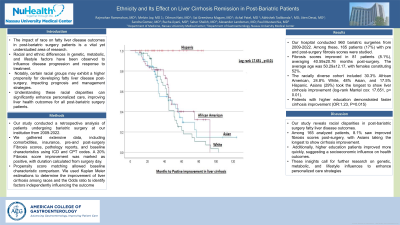Sunday Poster Session
Category: Liver
P0980 - Ethnicity and Its Effect on Liver Cirrhosis Remission in Post-Bariatric Patients
Sunday, October 22, 2023
3:30 PM - 7:00 PM PT
Location: Exhibit Hall


Rajmohan Rammohan, MD
Nassau University Medical Center
East Meadow, NY
Presenting Author(s)
Rajmohan Rammohan, MD, Sai Greeshma Magam, MD, Dilman Natt, MD, Melvin Joy, MD, Tulika Saggar, MD, Achal Patel, MD, Abhishek Tadikonda, MD, Neda Sohrabi, MD, Jiten Desai, MD, Sandra Gomez, MD, Saher Sheikh, MD, Rucha Jiyani, MD, Paul Mustacchia, MD, MBA
Nassau University Medical Center, East Meadow, NY
Introduction: The impact of race on fatty liver disease outcomes in post-bariatric surgery patients is a vital yet understudied area of research. Racial and ethnic differences in genetic, metabolic, and lifestyle factors have been observed to influence disease progression and response to treatment. Notably, certain racial groups may exhibit a higher propensity for developing fatty liver disease post-surgery, impacting prognosis and management strategies. Understanding these racial disparities can significantly enhance personalized care, improving liver health outcomes for all post-bariatric surgery patients.
Methods: Our study conducted a retrospective analysis of patients undergoing bariatric surgery at our institution from 2009-2022. We gathered extensive data, including comorbidities, insurance, pre-and post-surgery Fibrosis scores, pathology reports, and baseline characteristics using ICD and CPT codes. A 20% Fibrosis score improvement was marked as positive, with duration calculated from surgery day. Propensity score matching allowed baseline characteristic comparison. We used Kaplan Meier estimations to determine the improvement of liver cirrhosis among races and the Odds ratio to identify factors independently influencing the outcome
Results: Our hospital conducted 960 bariatric surgeries from 2009-2022. Among these, 165 patients (17%) with pre and post-surgery fibrosis scores were studied. Fibrosis scores improved in 81 patients (8.1%), averaging 40.59±20.76 months post-surgery. The average age was 50.29±12.17, with females constituting 52%. The racially diverse cohort included 30.3% African American, 24.8% White, 48% Asian, and 17.5% Hispanic. Asians (29%) took the longest to show liver cirrhosis improvement (log-rank Mantel cox: 17.651, p< 0.01). Patients with higher education demonstrated faster cirrhosis improvement (OR:1.23, P=0.015)
Discussion: Our study reveals racial disparities in post-bariatric surgery fatty liver disease outcomes. Among 165 analyzed patients, 8.1% saw improved fibrosis scores post-surgery, with Asians taking the longest to show cirrhosis improvement. Additionally, higher education patients improved more quickly, suggesting a socioeconomic influence on health outcomes. These insights call for further research on genetic, metabolic, and lifestyle influences to enhance personalized care strategies

Disclosures:
Rajmohan Rammohan, MD, Sai Greeshma Magam, MD, Dilman Natt, MD, Melvin Joy, MD, Tulika Saggar, MD, Achal Patel, MD, Abhishek Tadikonda, MD, Neda Sohrabi, MD, Jiten Desai, MD, Sandra Gomez, MD, Saher Sheikh, MD, Rucha Jiyani, MD, Paul Mustacchia, MD, MBA. P0980 - Ethnicity and Its Effect on Liver Cirrhosis Remission in Post-Bariatric Patients, ACG 2023 Annual Scientific Meeting Abstracts. Vancouver, BC, Canada: American College of Gastroenterology.
Nassau University Medical Center, East Meadow, NY
Introduction: The impact of race on fatty liver disease outcomes in post-bariatric surgery patients is a vital yet understudied area of research. Racial and ethnic differences in genetic, metabolic, and lifestyle factors have been observed to influence disease progression and response to treatment. Notably, certain racial groups may exhibit a higher propensity for developing fatty liver disease post-surgery, impacting prognosis and management strategies. Understanding these racial disparities can significantly enhance personalized care, improving liver health outcomes for all post-bariatric surgery patients.
Methods: Our study conducted a retrospective analysis of patients undergoing bariatric surgery at our institution from 2009-2022. We gathered extensive data, including comorbidities, insurance, pre-and post-surgery Fibrosis scores, pathology reports, and baseline characteristics using ICD and CPT codes. A 20% Fibrosis score improvement was marked as positive, with duration calculated from surgery day. Propensity score matching allowed baseline characteristic comparison. We used Kaplan Meier estimations to determine the improvement of liver cirrhosis among races and the Odds ratio to identify factors independently influencing the outcome
Results: Our hospital conducted 960 bariatric surgeries from 2009-2022. Among these, 165 patients (17%) with pre and post-surgery fibrosis scores were studied. Fibrosis scores improved in 81 patients (8.1%), averaging 40.59±20.76 months post-surgery. The average age was 50.29±12.17, with females constituting 52%. The racially diverse cohort included 30.3% African American, 24.8% White, 48% Asian, and 17.5% Hispanic. Asians (29%) took the longest to show liver cirrhosis improvement (log-rank Mantel cox: 17.651, p< 0.01). Patients with higher education demonstrated faster cirrhosis improvement (OR:1.23, P=0.015)
Discussion: Our study reveals racial disparities in post-bariatric surgery fatty liver disease outcomes. Among 165 analyzed patients, 8.1% saw improved fibrosis scores post-surgery, with Asians taking the longest to show cirrhosis improvement. Additionally, higher education patients improved more quickly, suggesting a socioeconomic influence on health outcomes. These insights call for further research on genetic, metabolic, and lifestyle influences to enhance personalized care strategies

Figure: Liver cirrhosis time line among races
Disclosures:
Rajmohan Rammohan indicated no relevant financial relationships.
Sai Greeshma Magam indicated no relevant financial relationships.
Dilman Natt indicated no relevant financial relationships.
Melvin Joy indicated no relevant financial relationships.
Tulika Saggar indicated no relevant financial relationships.
Achal Patel indicated no relevant financial relationships.
Abhishek Tadikonda indicated no relevant financial relationships.
Neda Sohrabi indicated no relevant financial relationships.
Jiten Desai indicated no relevant financial relationships.
Sandra Gomez indicated no relevant financial relationships.
Saher Sheikh indicated no relevant financial relationships.
Rucha Jiyani indicated no relevant financial relationships.
Paul Mustacchia indicated no relevant financial relationships.
Rajmohan Rammohan, MD, Sai Greeshma Magam, MD, Dilman Natt, MD, Melvin Joy, MD, Tulika Saggar, MD, Achal Patel, MD, Abhishek Tadikonda, MD, Neda Sohrabi, MD, Jiten Desai, MD, Sandra Gomez, MD, Saher Sheikh, MD, Rucha Jiyani, MD, Paul Mustacchia, MD, MBA. P0980 - Ethnicity and Its Effect on Liver Cirrhosis Remission in Post-Bariatric Patients, ACG 2023 Annual Scientific Meeting Abstracts. Vancouver, BC, Canada: American College of Gastroenterology.
